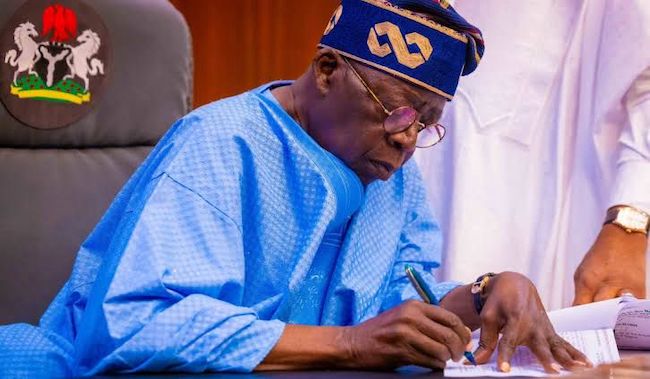A Nation Bound by Debt: Examining President Tinubu’s Fresh Borrowing Plan
By Matthew Eloyi
In yet another display of Nigeria’s increasing reliance on external debt, President Bola Tinubu has sought the National Assembly’s approval for a new $2.209 billion loan to partially fund the 2024 budget deficit of N9.7 trillion.
While proponents of the borrowing argue it is necessary for funding government operations and projects, a closer examination reveals troubling implications for Nigeria’s financial health and economic future.
Nigeria’s ballooning debt profile has become a recurring feature of governance. Recent data from the Central Bank of Nigeria (CBN) paints a grim picture: foreign debt servicing consumed a staggering $3.58 billion in the first nine months of 2024 alone, marking a 39.77% increase from the $2.56 billion spent in the same period of 2023. These figures underscore a disturbing trend of spiraling debt obligations, exacerbated by exchange rate volatility and fiscal inefficiencies.
May 2024, for instance, recorded an unprecedented $854.37 million in foreign debt servicing—almost four times the $221.05 million paid in May 2023. This surge highlights how external debt obligations are crowding out resources that could be directed toward critical sectors like healthcare, education, and infrastructure development.
The devaluation of the naira has further compounded Nigeria’s debt woes. From N899.39/$1 in December 2023 to N1,470.19/$1 by mid-2024, the currency’s freefall has amplified the burden of foreign loan repayments. States are also not spared; their external debt grew from $4.61 billion to $4.89 billion in the same period. This depreciation means that even smaller loans require significantly larger amounts of naira to service, draining already stretched public coffers.
The proposed loan is emblematic of a deeper structural issue: over-reliance on debt to finance budgetary deficits. It reflects an alarming lack of fiscal discipline and a failure to address systemic revenue shortfalls. In 2023, 32 states relied on federally allocated revenues for at least 55% of their budgets, with 14 states exceeding a dangerous threshold of 70%.
This heavy dependence on oil revenue and federal allocations makes Nigeria’s economy highly vulnerable to crude oil price shocks. For a country endowed with vast human and natural resources, this level of financial fragility is inexcusable.
President Tinubu’s administration argues that the borrowing is necessary to implement critical welfare and development projects. However, critics are questioning whether taking on more debt is a sustainable way to achieve these goals. For example, the president has also proposed amendments to the National Social Investment Programme (NSIP) bill to institutionalize the use of a social register for welfare programmes. While laudable in intent, these welfare schemes risk becoming ineffective if debt obligations continue to consume the bulk of national revenue.
Moreover, the growing debt raises questions about intergenerational equity. Is it fair to saddle future generations with mountains of debt to pay for today’s expenditures, particularly when there is little evidence of tangible benefits from previous loans?
Nigeria’s fiscal trajectory is clearly unsustainable. Without aggressive revenue generation strategies, stringent budget cuts, and effective debt management policies, the country risks sliding further into a debt trap. The government must focus on enhancing internally generated revenue (IGR), curbing wasteful spending, and creating a more diversified economy less reliant on volatile oil revenues.
Furthermore, states like Lagos and Ogun have demonstrated the potential of robust IGR, contributing significantly to their fiscal sustainability. Their models should serve as templates for other states struggling to manage their finances.
President Tinubu’s new borrowing request highlights the precarious state of Nigeria’s fiscal health. While debt can be a useful tool for development when managed prudently, Nigeria’s current trajectory suggests a lack of strategic planning and fiscal discipline.
It is imperative for the National Assembly to thoroughly scrutinize this borrowing plan and demand greater accountability. Without a clear roadmap for fiscal sustainability, approving this loan would be a disservice to the Nigerian people. It is time for the government to explore innovative solutions that prioritise economic stability over short-term fixes that perpetuate a cycle of debt dependency.

